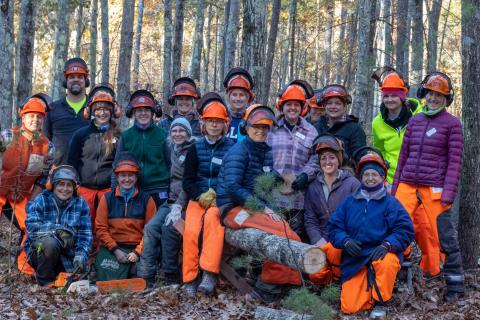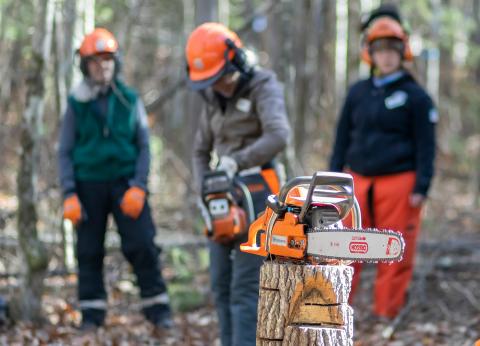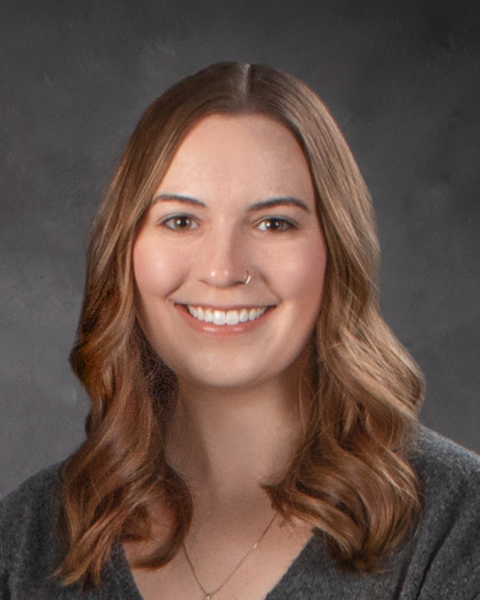Women in the Woods
Have you ever walked in the woods while 15 women are running chainsaws? While historically this hasn’t been a common sight in New Hampshire, UNH Extension is now helping make it a more frequent reality.
The health of New Hampshire’s forests is defined by the ability of private landowners to make informed management decisions on their properties. Women landowners contribute to management decisions on over 1.8 million acres of the state’s forestland and are the primary decision makers on 23% (429,000 acres) of private forestland. Nationally, land ownership trends are showing that women are increasingly becoming the primary decision makers for privately owned forests.
Despite this national trend, research has revealed that women are less likely, overall, to participate in management activities, partly because outreach efforts have not reached women as successfully as men. In response to this need, UNH Extension, New Hampshire Timberland Owners Association (NHTOA), the Society for the Protection of New Hampshire Forests (Forest Society) and other partners have committed to increasing engagement with this underserved and underrepresented audience through the Women in the Woods program. Women in the Woods programming is open to all participants, but is designed for marginalized genders, including women, women-identifying individuals, and non-binary and gender non-conforming people who are comfortable in a space that centers the learning experiences of women.
“Women landowners play a significant role in managing New Hampshire's forests, and it’s important we support them with the resources, training and skills they need to make stewardship decisions and effectively manage their forestland,” says Haley Andreozzi, UNH Extension state specialist in wildlife conservation.
Women in the Woods workshops have included training on chainsaw safety and maintenance, tree identification, winter wildlife tracking and logging with farm tractors. A key component of these workshops is that they are designed for women and are led by women with experience in educational programs.
Rebecca DiGirolomo, UNH Extension natural resources field specialist, sees this trend reflected in requests for technical assistance visits in the communities she serves — Belknap and Strafford counties. “More than half of the visits I have had in 2022 were requested by women landowners, professionals or volunteers,” she says.
With support from the USDA Forest Service, the team is identifying needs and implementing outreach strategies to support women landowners. As the primary outreach mechanism of UNH, Extension is in a unique position to provide project leadership in survey development and distribution, network creation, trainings and evaluation.
“The Women in the Woods program allows us to utilize Extension’s existing connections to landowners, relationships with conservation partners and expertise in outreach and engagement, but with special attention paid to what women landowners want and need,” says Andreozzi.
The Women in the Woods team is comprised of UNH Extension State Specialist for Wildlife Conservation Haley Andreozzi, UNH Extension Forest Stewardship Outreach Program Manager Amy Gaudreau, UNH Extension Natural Resources Field Specialist Rebecca DiGirolomo, UNH Extension Natural Resources Field Specialist Wendy Scribner, NHTOA Program Director Cheri Birch and Forest Society Managing Forester Wendy Weisiger.
Research Needed
No studies have been conducted in New Hampshire to examine women’s behaviors and attitudes towards forest management or the barriers they face. In my position with Extension and for graduate research, I collaborated with the Women in the Woods program to develop a statewide needs assessment of women forest landowners and managers. The survey collects information about barriers to forest management, skills needed, land stewardship priorities and demographic information. It also examines personal experiences and opinions among women who own or manage forestland. The information collected from the survey will inform strategies for program development, workshop topics, resource creation and technical assistance.
—UNH Extension Forest Stewardship Outreach Program Manager Amy Gaudreau
Are you interested in learning more about Women in the Woods and upcoming events?
Sign up for our newsletter to receive updates.




